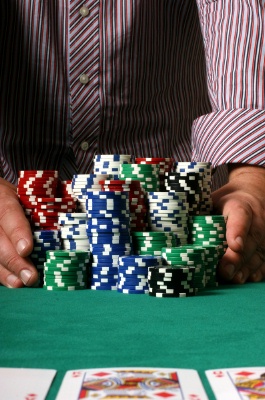|
|

Bet - A wager of money or chips.
A bet is a wager of money or chips that other players must match if they wish to continue on in the hand. A poker hand will typically
have several rounds of betting. During each round, each player will have one or more chances to bet or raise (increase the bet) or to
check (let the bet pass ). In a limit game the bets are structured, which means the size of the bets are determined by the game’s limit.
Since you have no input into the size of the bet in a limit game, you only have to decide whether to bet or not. In a No Limit game the
betting is unstructured. This means you are free to bet any amount as long as you meet the requirement for the minimum allowable bet. In
these games you must not only decide whether to bet or not, but you also must decide how much to bet.
In addition to the regular betting that goes on during the hand, some players will occasionally place side bets. Side bets are
additional wagers on randomly occurring events, for example, if there will be more black cards or red cards on the flop. These bets are
not sanctioned by the house, no rake is taken on them, and the house generally regards them as unenforceable. Many casinos have even
disallowed side bets, but this is rarely enforced, and they are actually quite common, especially at the higher limits.
A type of bet you will commonly see is called a “feeler bet.” This is a bet made with the purpose of “feeling out” your opponent. The
idea is that you bet a hand of minimal or moderate strength into your opponent, to find out how strong they are. It is often made after
an opponent has raised preflop, and you want to find out if they still have a raising hand on the flop. If an opponent raises your
feeler bet, it often indicates a strong hand, and you may be forced to throw your hand away. If your opponent only calls, it indicates
weakness, and your hand may be good. Feeler bets are often made early in the hand, when the bets tend to be smaller.
Another example of a type of bet is a bait or trapping bet. If you can get your opponents to believe that you have a weak hand, when in
fact you have a strong one, you may be able to get them to put money in the pot with little or no chance of winning. When you play, your
opponents will be looking for signs of weakness: a check, a bet that is too small, various body language tells, etc. Often, if they
sense that you are weak, they will try to take the pot from you with either a large bet or a raise. If you intentionally give them these
signs of weakness, called bait, you may be able to get them to play at you. This is called setting a trap. This type of play works best
against highly aggressive players who tend to over bet their hands.
 An entirely different type
of bet associated with poker is a "prop bet". Prop bets do not involve winning and losing poker hands. In fact, they cover everything
else under the sun, from whether a flop will come with more red cards or black cards to who will win the first pot with 72 offsuit to
who can jump over a table without touching it to weight loss bets. Prop bets usually do not involve games or hands themselves, but get
associated with poker because some poker players enjoy them as a means of breaking the monotony of games or simply to "gamble"
on random or exotic actions. An entirely different type
of bet associated with poker is a "prop bet". Prop bets do not involve winning and losing poker hands. In fact, they cover everything
else under the sun, from whether a flop will come with more red cards or black cards to who will win the first pot with 72 offsuit to
who can jump over a table without touching it to weight loss bets. Prop bets usually do not involve games or hands themselves, but get
associated with poker because some poker players enjoy them as a means of breaking the monotony of games or simply to "gamble"
on random or exotic actions.
Also see: advertising,
blind raise,
check raise,
semi-bluff
Usage: Flop Bet, Turn Bet, River Bet, Side Bet, Feeler Bet, Betting, Bettor
Previous Poker Term: Belly Buster
Next Poker Term: Big Blind
|
|









